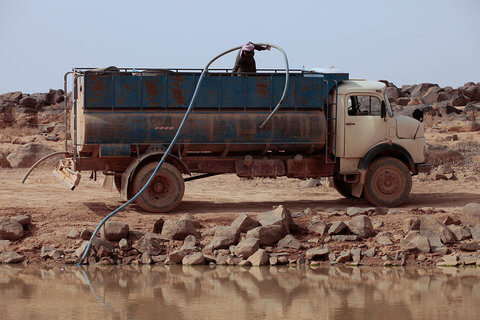In Jordan, a shadow market for drinking water is booming. For every gallon of water that’s pumped and trucked to consumers from the country’s officially licensed wells, 10 gallons are sold illegally, according to new research published Aug. 14 in Nature Sustainability
The study reveals a massive and accelerating transfer of water from rapidly dwindling rural groundwater sources to residents and businesses in urban areas, where public water supplies are often unreliable and unequally distributed.
The analysis, which involved more than a dozen researchers from several institutions including Stanford University, suggests household reliance on deliveries from unlicensed wells via private tanker trucks will more than double by 2050 as population growth and climate change drive water shortages.
Informal tanker water markets play a significant role in providing drinking water in major cities around the world, such as Beirut, Chennai, Mexico City, Mumbai, and Nairobi. In Jordan, “The implications of illegal water deliveries by tanker truck have been completely underestimated until now,” said study lead author Christian Klassert, an economist at the Helmholtz Centre for Environmental Research in Leipzig, Germany, who was a visiting postdoctoral fellow at Stanford.
High price for a precious resource
Illegal water pumping comes at a steep cost, with the unregulated tanker water market in Jordan supplying only 15% of the drinking water, while attracting more than half of the money that urban residents and businesses spend each year on water. This saps resources that could otherwise be used to improve the public water supply.
“Without revenues accruing to the government from the vast quantity of unlicensed tanker supplies, significant funds remain unavailable to improve the nation’s intermittent and inefficient supply system,” said study co-author Steven Gorelick, a professor of Earth system science at the Stanford Doerr School of Sustainability.
The analysis is the latest work from the FUSE Project (Food-water-energy for Urban Sustainable Environments), a research consortium led by Gorelick that has focused on water security issues in Jordan and India.
A disappearing lifeline
The new Nature Sustainability study notes that growth of the tanker market is a “warning sign” of the declining capacity of public supply systems to meet the United Nations’ goal of ensuring sustainable freshwater management and universal access to clean water and sanitation. Tanker trucks today are filling a critical gap in water security in Jordan, supplying as much as 92% of all households that receive less than 40 liters of piped water per person per day. “Their high prices and negative impacts are a direct consequence of the inability of public water supply to meet all demands,” the authors write.
But the lifeline won’t last: Tanker water market growth cannot keep pace with population pressures, the authors found. As the number of households receiving that bare-minimum supply of piped water increases fivefold by 2050 and groundwater levels closest to cities decline, the research suggests many households will lose access to increasingly expensive water deliveries.
The research points to several complementary solutions, ranging from fixing deteriorating water pipes to desalinating seawater at large scale. The authors were surprised to find that simply closing illegal wells – an approach that has helped to curb excess groundwater pumping for agriculture – would do more harm than good by limiting water access.
The analysis indicates a more effective policy would curtail licenses for tanker sales to businesses over time, while allowing sales to households to grow in proportion to the population. Study co-author Bernd Klauer, a water economist at the Helmholtz Centre for Environmental Research, explained, “Not only would less water be lost, but the water supplied would also be distributed more equitably.”
If our reporting has informed or inspired you, please consider making a donation. Every contribution, no matter the size, empowers us to continue delivering accurate, engaging, and trustworthy science and medical news. Independent journalism requires time, effort, and resources—your support ensures we can keep uncovering the stories that matter most to you.
Join us in making knowledge accessible and impactful. Thank you for standing with us!

